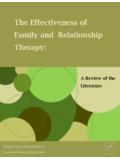Transcription of The effectiveness of Supportive Counselling, based on ...
1 The effectiveness of Supportive counselling , based on Rogerian principles: A systematic review of recent international and Australian research. Dr Nicky Jacobs and Dr Andrea Reupert PACFA, May 2014. This publication is copyright. No part may be reproduced by any process except in accordance with the provisions of the Copyright Act 1968. Suggested citation: Jacobs, N. & Reupert, A. (2014), The effectiveness of Supportive counselling , based on Rogerian principles: A systematic review of recent international and Australian research. Melbourne: PACFA. Acknowledgments: The review was generously funded by an anonymous philanthropic body. Correspondence concerning this article should be addressed to: Dr Nicky Jacobs, Monash University, email: Dr Andrea Reupert, Monash University, email: Contents Foreword .. 1. Abstract .. 2. Introduction .. 3. Humanistic, non-directive or Supportive counselling .. 3. Method .. 5. Search 5. Eligibility Criteria .. 5. Results .. 6. Table 1: Country of Origin for Eligible Studies.
2 7. Table 2: Presenting Problem or Diagnosis of Clients in Eligible Studies .. 7. Meta-analyses .. 8. Systematic reviews .. 9. Studies where SC/ST, PCT or a NDST was the primary therapy candidate .. 9. Studies where SC/ST, PCT, NDST was compared as an equal therapy to other therapies .. 10. Studies where SC/ST, PCT or NDST was the control group .. 10. Australian research .. 11. Discussion .. 11. Conclusion .. 13. References .. 14. Appendix 18. Appendix 19. Appendix 20. Appendix 21. Appendix 24. Appendix 25. Foreword This document is a literature review of research into the effectiveness of Supportive counselling , intended as a resource for counsellors and psychotherapists. It demonstrates the effectiveness of Supportive counselling for a range of psychological conditions. The PACFA Research Committee recognises that it is important to counsellors and psychotherapists that they have access to recent research evidence that demonstrates the effectiveness of different therapeutic approaches, to assist them in their practice.
3 This review is one of a series of reviews that has been commissioned by the PACFA Research Committee to support its Member Associations in their work. It was written on behalf of the PACFA Research Committee. However, this does not imply that PACFA or its Member Associations endorses any of the particular treatment approaches described. The Committee endorses the American Psychological Association's definition of evidence- based practice as the integration of the best available research evidence with clinical expertise in the context of patient characteristics, culture and preferences' (although we refer to a client or consumer rather than patient'). The Committee recognises that there is significant research evidence to indicate the effectiveness of counselling and psychotherapy and that different methods and approaches show broadly equivalent effectiveness . The Common Factors research, in particular, has shown the centrality of the therapeutic relationship, and the relatively minimal relevance of specific techniques, to positive therapeutic outcomes.
4 The Committee acknowledges that an absence of evidence for a particular counselling or psychotherapy intervention does not mean that it is ineffective or inappropriate. Rather, the evidence showing equivalence of effect for different counselling and psychotherapy interventions justifies a starting point assumption of effectiveness . It should be noted that this review is necessarily limited in its scope and examines the types of mental health issues that Supportive counselling is effective in treating. The Committee is committed to supporting PACFA Member Associations and Registrants to develop research protocols that will help the profession to build the research base to support the known effectiveness of counselling and psychotherapy. We hope that you find this review, and others in this series, useful for your own research and advocacy purposes. We welcome your feedback. Dr Elizabeth Day Chair of the PACFA Research Committee May 2014. Page | 1. Abstract The purpose of this paper is to present a systematic literature review of the effectiveness of Supportive counselling (SC) based on Rogerian principles.
5 This review of recent international (last five years) and Australian (last ten years) papers was employed using the PsycINFO, Ovid Medline, APAIS (Informit), Web of Science and Social Services Abstracts data bases. Various terms were employed encompassing Supportive counselling (SC) including; Person Centred Therapy (PCT), Non-Directive Supportive Therapy (NDST) and Supportive Therapy (ST). A total of 26 international papers and two Australian papers met the inclusion criteria. Papers were grouped into (i) meta-analyses and systematic reviews (n=4) as well as papers (ii) where SC was the primary therapeutic candidate (n=10), (iii) where SC was equally compared to other therapies (n=3) and (iv) where SC was the alternative, control therapy (n=. 11). Various methodological issues were identified, primarily in the way SC was defined, implemented and compared to other therapies. Overall, while a number of methodological issues preclude definitive claims, there is evidence to suggest that the group of therapies often referred to as Supportive are effective, and equally as effective as selected other therapies, in the treatment of adult depression.
6 Page | 2. Introduction Many therapists identify with a humanistic or a Supportive orientation to therapy, in Australia and elsewhere. A 2004 survey of professional and clinical members of the Psychotherapy and counselling Federation of Australia found 12% of respondents nominated humanistic approaches as being their primary theoretical orientation (Schofield, 2008). A somewhat larger percentage was found in the USA: from over 2,200 North American psychotherapists, Cook and colleagues (2010) found that a fifth (31%) identified with a Rogerian/client-centered/humanistic orientation. At the same time, the most commonly endorsed therapeutic techniques in this same survey were; conveying warmth and respect, communicating understanding of a client's experience, empathizing with the client, promoting clear, direct expression of client's feelings, making reflective or clarifying comments and cultivating the therapeutic relationship. These techniques are at the core of Rogers' (1957) person-centred approach, which focuses on building and sustaining a good therapeutic alliance.
7 Thus, even though some counsellors might not identify as humanistic, many employ the techniques commonly associated with a Rogerian approach. The prevalent use of these humanistic and Supportive approaches makes it critical to ascertain how effective these are in therapeutic environments. Humanistic, non-directive or Supportive counselling Carl Rogers was among the founders of the humanistic approach to psychology. There are a variety of terms that are often used interchangeably in his therapeutic approach including Client-Centred Therapy (CCT), Person-Centred Therapy (PCT) or Non-Directive Supportive Therapy (NDST) (Gibbard & Hanley, 2008). Rogers argued that human beings are on the whole positively motivated, with a natural internal drive towards growth and adjustment (Thorne, 2003). This natural tendency is to become a fully functioning individual, or in other words, to become who we truly are. The counsellor who provides the right conditions in the counselling relationship will enable clients to choose to become their true selves (Thorne, 2003).
8 In 1957, Rogers argued that there were six, fundamental conditions necessary and sufficient for client growth: 1. Two persons are in psychological contact. 2. The first, whom we shall term the client, is in a state of incongruence, being vulnerable or anxious. 3. The second person, whom we shall term the therapist, is congruent or integrated in the relationship. 4. The therapist experiences unconditional positive regard for the client. 5. The therapist experiences an empathic understanding of the client's internal frame of reference and endeavours to communicate this experience to the client. 6. The communication to the client of the therapist's empathic understanding and unconditional positive regard is to a minimal degree achieved (Rogers, 1957, p. 96). Page | 3. The six conditions are interrelated and of equal importance: this means that one cannot exist without the other. Rogers also asserted that the above six conditions were not about specific techniques but were instead an integrated part of the counsellor's personality and belief system about human nature and a client's capacity to grow and self-actualize.
9 Nonetheless, some have attempted to operationalize these core conditions into specific counsellor behaviours. For example, Tursi and Cochran (2006) include attending, reflecting, clarifying, paraphrasing and summarising as the behaviours often associated with PCT along with the avoidance of questioning clients. Another therapeutic stance that has attracted some attention in recent times is related to counsellor non-directivity. Non-directive counselling involves the counsellor attending to the client's internal processes without interfering (Meador & Rogers, 1984). According to Bohart (2013) Rogers defined the non- directive stance as the client having a right to select his or her own goals in therapy. Bohart (2013, p. 142) further elaborates when he writes that therapist non-directive-ness: explicitly attempts to model the idea that the therapist is not the expert (the client is), that listening to the client is the ultimate value and that trusting the client to find his or her own path and to make wise choices for him or herself is the ultimate way of proceeding.
10 Thus, the basis of non-directivity is a belief that the client is the expert in his or her own life, rather than a specific or pre-determined set of techniques that a person-centred counsellor should or should not employ. In recent times, there are some counsellors who have incorporated an active problem solving component in the non-directive approach to PCT. (Knight, 2007) or cognitive behaviour therapy techniques (including homework) (Tursi &. Cochran, 2006). Such inclusions are however only appropriate if aligned with client goals and consistent with the six core conditions highlighted earlier. Another, related modality, Supportive counselling (SC) (sometimes also referred to as Supportive Therapy, ST) is in many ways similar to PCT though much of the theoretical discussion on this is dated. For example, Winston, Pinsker and McCullough (1986) list the various techniques associated with SC; a style of communication where the therapist is real for the client, demonstrating respect, allowing the client to vent (involving an active response from the therapist that could include universalizing and de-catastrophizing), praising and giving advice and reassurance.






